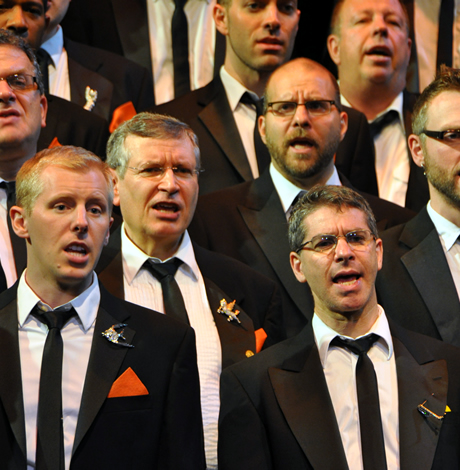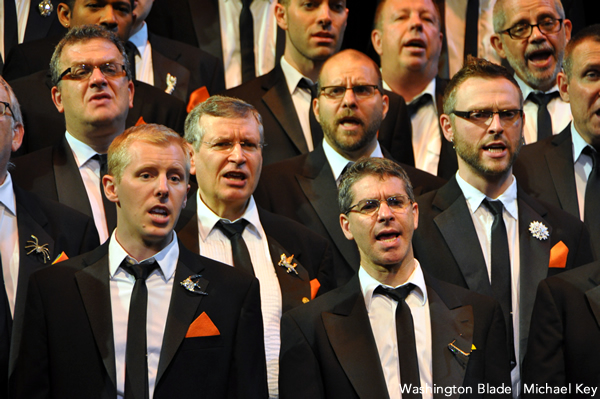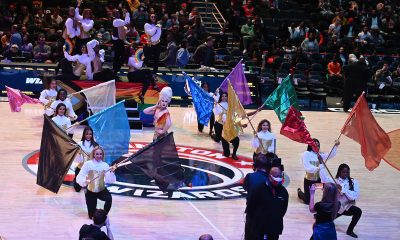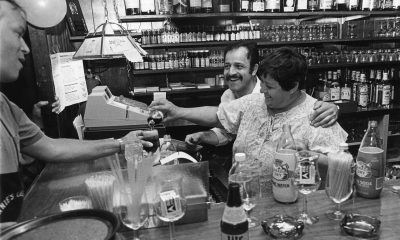Arts & Entertainment
SPRING ARTS 2018 CLASSICAL: A new spin on Durufle’s ‘Requiem’
Gay Men’s Chorus director revoices famous work


The Gay Men’s Chorus of Washington has a busy spring. Although the chorus has always interspersed classical selections in with its contemporary, more LGBT-themed material, it has done more classical major works in recent years. (Washington Blade file photo by Michael Key)
Classical music is funny when it comes to LGBT stuff — on one hand, it’s no big deal. Nobody cares if the talent is there. Yet sometimes it’s taken to such an absurd degree that it feels disingenuous. Or the artists sometimes feel talking about their personal lives will cheapen their art or dilute its impact in an arena where it’s not supposed to matter.
All that to say — comb through the classical spring concerts coming up and there’s very few LGBT themes or personnel to point to. And yet many folks active in that world say our regional orchestras, opera companies and choirs are just as healthily outfitted with gays as the rest of the city. Maybe not quite as high in number as, say, the uber-queer D.C. theater community, but not off by much. It’s anecdotal so yeah, take it with a grain of salt, but that’s what you go by when there are no hard numbers available.
The gayest classical concert this season by far comes from an unlikely source — our Gay Men’s Chorus. While their musical chops have never been questioned — they’re enjoying a rich new era under the direction of Artistic Director Thea Kano — the fact that they do so much Broadway, camp, music-with-a-message, pop covers, you name it really, folks who love the classical canon around here tend to gravitate to local choirs (and there are many) that stick to the traditional repertoire.
It’s even a “thing” in the chorus. Kano, with a chuckle, refers to the “SMQs” (i.e. “serious music queens”) in the massive choir. Those SMQs, she says, were giddy with delight when she told them one of their 2018 concerts was a new tenor/bass arrangement of Maurice Durufle’s “Requiem.” The Chorus performs it this weekend (Saturday, March 3) at 8 p.m. at the Church of the Epiphany (1317 G St., N.W.). Tickets are $60. Full details at gmcw.org.
Kano, as big an ally as it gets, was in her third year of graduate school at UCLA in 2003 working on an advanced conducting degree when she first became aware of the famous “Requiem,” or “Mass for the dead.” She and her mentoring professor were considering ideas for what she might do her dissertation on and he suggested the “Requiem.”
“He said the Durufle ‘Requiem’ and I was like, ‘The who, the what?,’” Kano says. “He said, ’Shame on you,’ and sent me home with a bunch of CDs. I put the first one in and was just moved to tears. There’s something just glorious about it.”
It did become her dissertation piece and longtime chorus accompanist Teddy Guerrant suggested she adapt it for tenor-and-bass chorus.
“He actually kept bugging me about it over the years,” Kano says.
She had contacts with the Durufle Association (the composer, who was straight, died in 1986; the “Requiem” premiered in 1947) and went to Paris last summer to do the work of actually transcribing the nine-movement, about 40-minute piece, a process she says was, yes, tedious at times, but a process akin to working on a crossword puzzle that she came to love.
Composed for soprano-alto-tenor-bass (SATB) chorus with occasional divisi, Kano adapted it for tenor 1, tenor 2, baritone and bass (TTBB) a process that in many cases was as simple as taking the soprano and alto parts down an octave, although that wasn’t feasible in all places. It’s in the same key as the original; the same orchestral and organ accompaniments Durufle wrote are being used. Soprano Breanna Sinclaire (a trans Baltimore native who’s making a name for herself as an opera soloist) will perform the fifth movement, “Pie Jesu.”
“There are some passages where the sopranos (in the original) have the melody and they’re up in the rafters but now it’s been assigned to the baritones and it’s … kind of more smushed in there so we had to really bring the other sections’ volumes down and bring the other up to make sure it’s voiced so that what is prominent stands out to the ear of the audience,” Kano says. “The first few times I heard it live in the TTBB, I was like, ‘Wow, this sounds like Durufle but different.’ We’ve been working on it about seven or eight weeks and I think it’s just glorious. The audience is in for a real treat.”
Kano was delighted that about 140 of the chorus’s 300 (give or take) members signed on for the concert (they’re not required to). She was concerned some members who enjoy the more camp/pop stuff might not be up for such a major work from the classical canon, although the chorus has in previous years done adaptations of major works such as the Faure “Requiem” and “Carmina Burana.”
Because the “Requiem” was written in a style based on Gregorian plainchant (traditionally sung by male singers), the TTBB version required no great musicological backflips. And Kano says the majesty of the piece transcends its Christian text. If it seems an odd choice for the chorus, which specializes in more rah-rah-gay-type contemporary repertoire (although they’ve always done classical works as well), Kano says it’s its own statement of equality.
“Just the fact that we’re out as an LGBT chorus standing there and singing anything, you know, the stereotype of what the classical snobby choruses can do, just shows that we can raise our voices any way we feel is appropriate for our abilities. It puts us on the map that yes, we can sing anything and hopefully the audience will agree.”
Chorus member Tim Gillham, a tenor who joined the group in 2014, had previously sung the “Requiem” in the traditional voicing and said it’s been “truly a joy” to rediscover it in Kano’s version.
“Thea’s treatment brings an added depth and warmth to the work, which is especially appropriate for a ‘Requiem,’” he says.
“It’s been a total treat to have Thea work us through the music sections and share and feel her true passion for the music,” says Ed Oseroff, a bass who’s been with the Chorus since 2000. “I hope the audience will sit back, relax and let the emotion and power of the music take them away.”
As usual, it’s a busy spring for the Chorus. Its “Make America Gay Again” concert is Saturday, March 17; small ensembles’ “Extravaganza” is Saturday, April 14 at the Barns at Wolf Trap and “Transamerica,” a show about trans issues that will also feature Sinclaire, is June 2-3. Full details at gmcw.org.

Team DC, the umbrella organization for LGBTQ-friendly sports teams and leagues in the D.C. area, held its annual Night of Champions Awards Gala on Saturday, April 20 at the Hilton National Mall. The organization gave out scholarships to area LGBTQ student athletes as well as awards to the Different Drummers, Kelly Laczko of Duplex Diner, Stacy Smith of the Edmund Burke School, Bryan Frank of Triout, JC Adams of DCG Basketball and the DC Gay Flag Football League.
(Washington Blade photos by Michael Key)




















The 2024 National Cannabis Festival was held at the Fields at RFK Stadium on April 19-20.
(Washington Blade photos by Michael Key)
















Covering the @NatlCannaFest at RFK Stadium for @WashBlade . Stop by the LGBTQ+ booth and pick up a paper if you are here. pic.twitter.com/is7hnsaPns
— Michael Patrick Key (@MichaelKeyWB) April 20, 2024
Theater
‘Amm(i)gone’ explores family, queerness, and faith
A ‘fully autobiographical’ work from out artist Adil Mansoor

‘Amm(i)gone’
Thorough May 12
Woolly Mammoth Theatre
641 D St., N.W.
$60-$70
Woollymammoth.net
“Fully and utterly autobiographical.” That’s how Adil Mansoor describes “Amm(i)gone,” his one-man work currently playing at Woolly Mammoth Theatre.
Both created and performed by out artist Mansoor, it’s his story about inviting his Pakistani mother to translate Sophocles’s Greek tragedy “Antigone” into Urdu. Throughout the journey, there’s an exploration of family, queerness, and faith,as well as references to teachings from the Quran, and audio conversations with his Muslim mother.
Mansoor, 38, grew up in the suburbs of Chicago and is now based in Pittsburgh where he’s a busy theater maker. He’s also the founding member of Pittsburgh’s Hatch Arts Collective and the former artistic director of Dreams of Hope, an LGBTQ youth arts organization.
WASHINGTON BLADE: What spurred you to create “Amm(i)gone”?
ADIL MANSOOR: I was reading a translation of “Antigone” a few years back and found myself emotionally overwhelmed. A Theban princess buries her brother knowing it will cost her, her own life. It’s about a person for whom all aspirations are in the afterlife. And what does that do to the living when all of your hopes and dreams have to be reserved for the afterlife?
I found grant funding to pay my mom to do the translation. I wanted to engage in learning. I wanted to share theater but especially this ancient tragedy. My mother appreciated the characters were struggling between loving one another and their beliefs.
BLADE: Are you more director than actor?
MANSOOR: I’m primarily a director with an MFA in directing from Carnegie Mellon. I wrote, directed, and performed in this show, and had been working on it for four years. I’ve done different versions including Zoom. Woolly’s is a new production with the same team who’ve been involved since the beginning.
I love solo performance. I’ve produced and now teach solo performance and believe in its power. And I definitely lean toward “performance” and I haven’t “acted” since I was in college. I feel good on stage. I was a tour guide and do a lot of public speaking. I enjoy the attention.
BLADE: Describe your mom.
MANSOOR: My mom is a wonderfully devout Muslim, single mother, social worker who discovered my queerness on Google. And she prays for me.
She and I are similar, the way we look at things, the way we laugh. But different too. And those are among the questions I ask in this show. Our relationship is both beautiful and complicated.
BLADE: So, you weren’t exactly hiding your sexuality?
MANSOOR: In my mid-20s, I took time to talk with friends about our being queer with relation to our careers. My sexuality is essential to the work. As the artistic director at Dreams of Hope, part of the work was to model what it means to be public. If I’m in a room with queer and trans teenagers, part of what I’m doing is modeling queer adulthood. The way they see me in the world is part of what I’m putting out there. And I want that to be expansive and full.
So much of my work involves fundraising and being a face in schools. Being out is about making safe space for queer young folks.
BLADE: Have you encountered much Islamophobia?
MANSOOR: When 9/11 happened, I was a sophomore in high school, so yes. I faced a lot then and now. I’ve been egged on the street in the last four months. I see it in the classroom. It shows up in all sorts of ways.
BLADE: What prompted you to lead your creative life in Pittsburgh?
MANSOOR: I’ve been here for 14 years. I breathe with ease in Pittsburgh. The hills and the valleys and the rust of the city do something to me. It’s beautiful, it’ affordable, and there is support for local artists. There’s a lot of opportunity.
Still, the plan was to move to New York in September of 2020 but that was cancelled. Then the pandemic showed me that I could live in Pittsburgh and still have a nationally viable career.
BLADE: What are you trying to achieve with “Amm(i)gone”?
MANSOOR: What I’m sharing in the show is so very specific but I hear people from other backgrounds say I totally see my mom in that. My partner is Catholic and we share so much in relation to this.
I hope the work is embracing the fullness of queerness and how means so many things. And I hope the show makes audiences want to call their parents or squeeze their partners.
-

 South America4 days ago
South America4 days agoDaniel Zamudio murderer’s parole request denied
-

 Maryland4 days ago
Maryland4 days agoMontgomery County police chief discusses arrest of trans student charged with planned school shooting
-

 Commentary5 days ago
Commentary5 days agoWorld ‘isn’t much different today’
-

 Theater3 days ago
Theater3 days ago‘Amm(i)gone’ explores family, queerness, and faith












